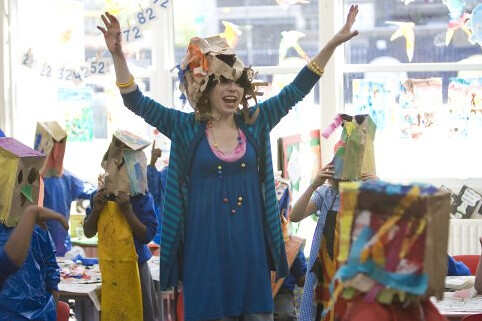
For once, I'm going to cut to the chase here. I love this film. I have seen it twice, now, and the second viewing has done nothing to lessen my love for it. In fact, it has intensified, because much like Mike Leigh's other films, there are many layers of depth among the characters that are very subtle, and that become more evident upon multiple viewings. As Leigh would tell you himself, his directing style is not so much about taking command and making his vision come alive. Rather, he starts with an idea or a general scenario, and he hires actors to collaborate with in developing the characters and the actual events that take place in the movie. It takes a village to make his films, and the result is that every single performance is rich, nuanced and powerful, such that you can't imagine that the actors actually have personalities different from that of their characters'.
The film revolves around Poppy, played by Sally Hawkins, who is a somewhat lower-middle class schoolteacher in London. She is perpetually chipper and giggling, wanting nothing more than to like and to help everyone. After her bike is stolen, she resolves to taking driving lessons, and is paired with her polar opposite, Scott, a bitter, misanthropic man who has no patience for Poppy's constant joking. This, however, is only the major source of conflict in the story, otherwise the film largely follows Poppy's life through injury, dance lessons, work, friendships, family relationships and love. This may sound somewhat Hallmark, but there is no saccharine sweetness to the story; it is a stark exposition of this woman's daily routine.
If I were to meet Poppy, I might possibly find her aggravating. In the very first scene, she is shopping and goes into a bookstore where her sprightliness is so irritating to the cashier that he does not engage her in conversation. Poppy takes all of this in stride and seems aware of her sometimes off-putting nature. She continues to live like this, because the friends who love her seem to truly love her for who she really is, and isn't that all that really matters? She does have a serious side, however, as shown in the way she handles a troubled student in her elementary school class. She takes him aside and arranges for him to meet a social worker, and her jocularity does not come through. If I were to know Poppy for a long time, I think I would grow to love her.
The story of Poppy and Scott, her driving instructor, is difficult to watch, but extremely engrossing. Poppy cannot help but push Scott's buttons, for he does baffling things like make vaguely racist assumptions, decry the entire English governing body, and designate a ridiculous mnemonic for checking mirrors (Enraha, the holy triangle). It is laughable, and Scott is kind of pathetic, but Poppy sees the troubled child that he must have been and, against better judgment, alternately tries to psychoanalyze him while continuing to "take the mickey" out of him. Scott is far too angry and confused about himself to understand Poppy's nature, but he refuses to give up on his driving pupil, so they continue to see each other, with somewhat grim results.
Just for kicks, I read some of the user reviews on Netflix after my second viewing, and I was pretty floored by the poor reception. Now, my taste diverges greatly from the average Netlix subscriber's, as evidenced by the fact that I strongly dislike to feel completely apathetic toward the majority of the 100 most popular titles. Yet I was surprised that there were not more people who were enchanted by Poppy's touching sweetness and humor, mixed with her flawed, though relatable, nature. The most common critique was that Poppy was annoying and the film was boring. I can understand people finding Mike Leigh's films boring, because he focuses much more heavily on character studies and interactions than plot, and he is definitely not a director that appeals to everyone. But despite the fact that, yes, Poppy is annoying, she is such a good person, and Sally Hawkins's portrayal is both subtle and bold. There are no flat characters, and no single person can be reduced to a caricature or stereotype.
Because this is how things are, because humans are varied and inconsistent, this is why I love Leigh's entire filmography. Not all of his movies are great, but he chooses to focus on building and developing really complete characters with the actors cast in the role. If what you are really seeking is a great story or exciting diversions or great artistry or special effects, and you could not care less for the characterizations, perhaps these films are not for you. There are nice stories sometimes and varying amounts of set design, but the acting is the main attraction. I love to see really great performances and characters who are as realistic as people you could meet in real life. There were times that I thought Poppy was being foolish or unwise, but people don't always make the right decisions and sometimes put themselves in dangerous or bad situations. It is brave and that might be why it is unpopular to take this strategy in filmmaking, but it works for me, and I always look forward to the next one.
